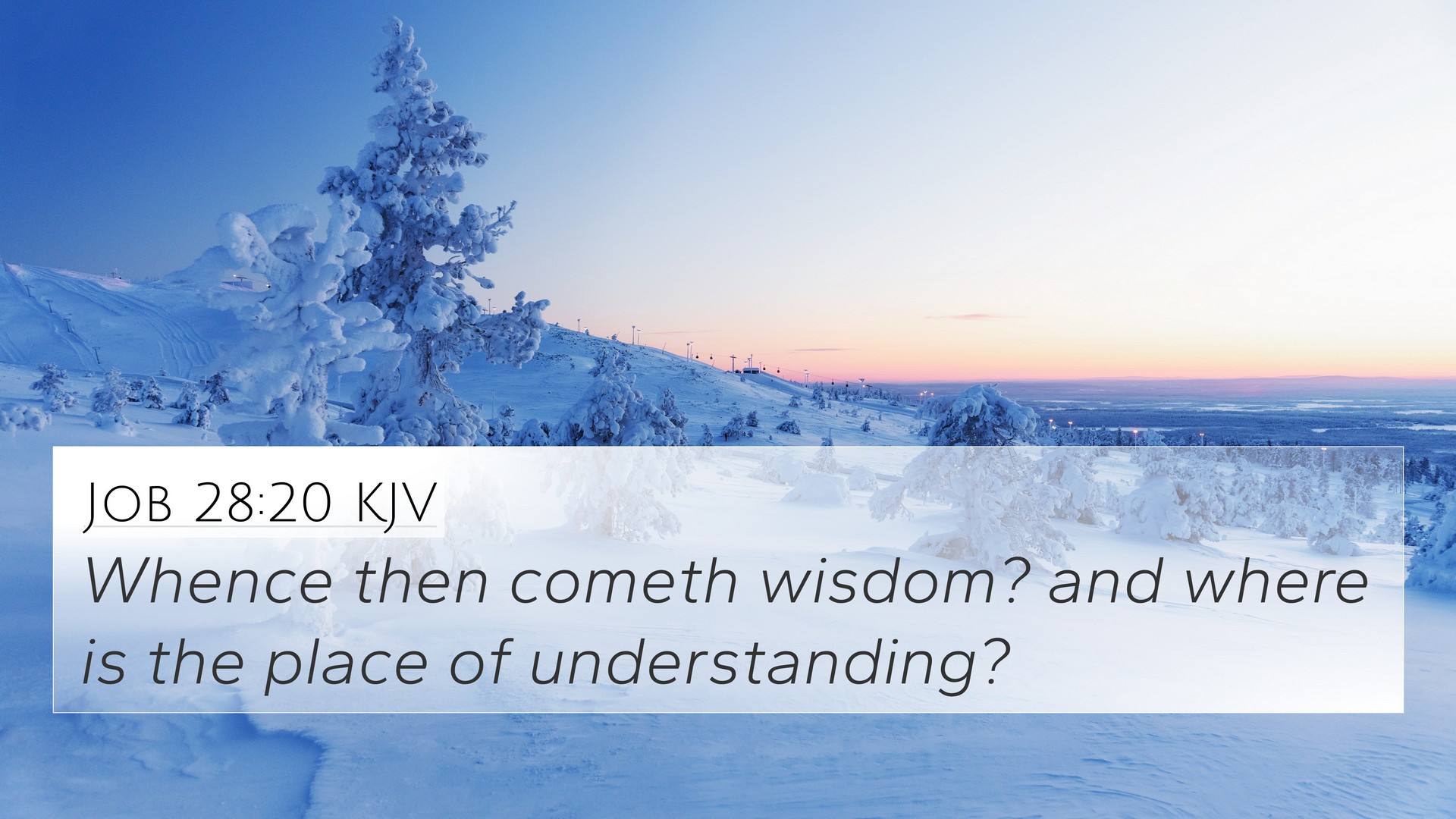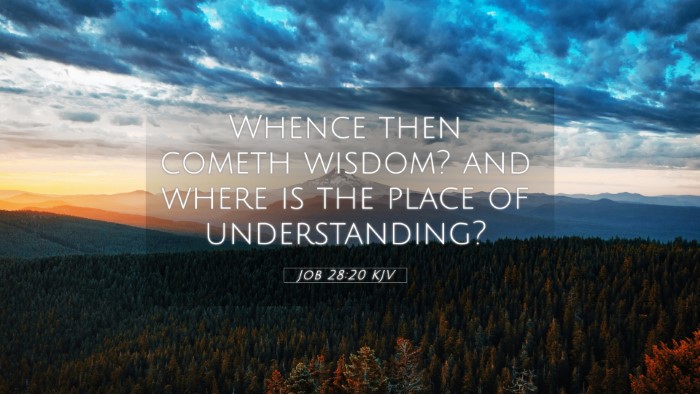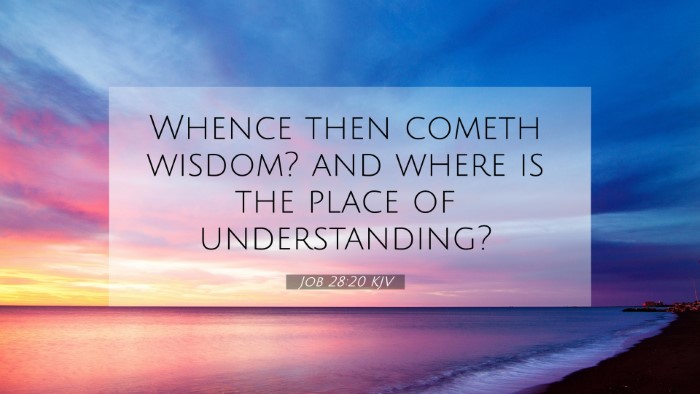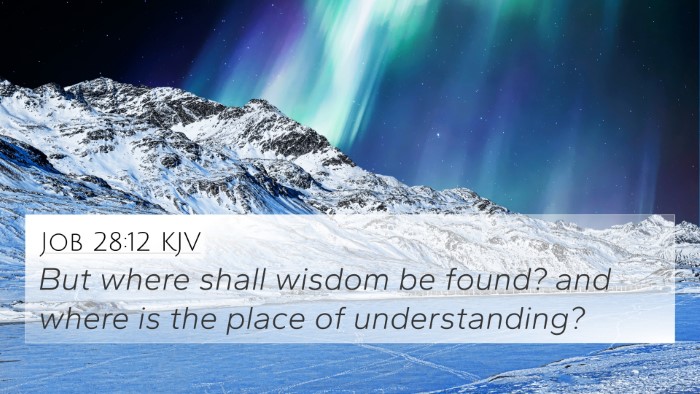Old Testament
Genesis Exodus Leviticus Numbers Deuteronomy Joshua Judges Ruth 1 Samuel 2 Samuel 1 Kings 2 Kings 1 Chronicles 2 Chronicles Ezra Nehemiah Esther Job Psalms Proverbs Ecclesiastes Song of Solomon Isaiah Jeremiah Lamentations Ezekiel Daniel Hosea Joel Amos Obadiah Jonah Micah Nahum Habakkuk Zephaniah Haggai Zechariah MalachiJob 28:20 Similar Verses
Job 28:20 Cross References
Whence then cometh wisdom? and where is the place of understanding?
Uncover the Rich Themes and Topics of This Bible Verse
Listed below are the Bible themes associated with Job 28:20. We invite you to explore each theme to gain deeper insights into the Scriptures.
Job 28:20 Cross Reference Verses
This section features a detailed cross-reference designed to enrich your understanding of the Scriptures. Below, you will find carefully selected verses that echo the themes and teachings related to Job 28:20 KJV. Click on any image to explore detailed analyses of related Bible verses and uncover deeper theological insights.
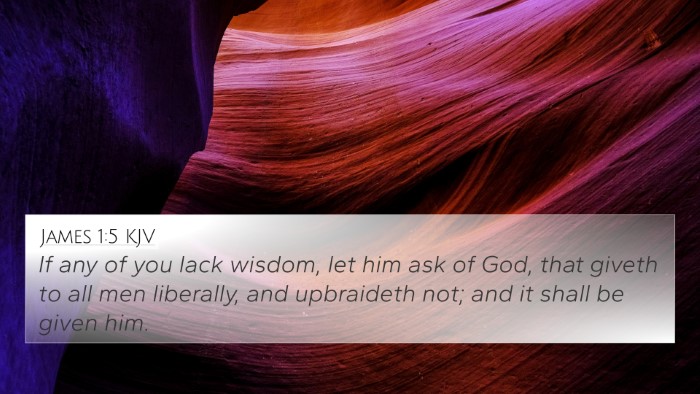
James 1:5 (KJV) »
If any of you lack wisdom, let him ask of God, that giveth to all men liberally, and upbraideth not; and it shall be given him.

James 1:17 (KJV) »
Every good gift and every perfect gift is from above, and cometh down from the Father of lights, with whom is no variableness, neither shadow of turning.
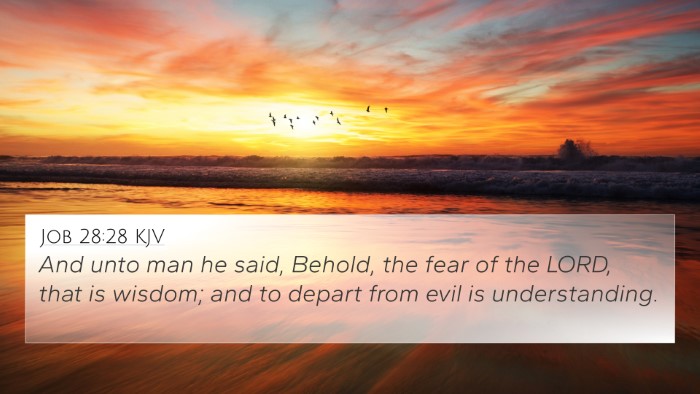
Job 28:28 (KJV) »
And unto man he said, Behold, the fear of the LORD, that is wisdom; and to depart from evil is understanding.

Proverbs 2:6 (KJV) »
For the LORD giveth wisdom: out of his mouth cometh knowledge and understanding.

Ecclesiastes 7:23 (KJV) »
All this have I proved by wisdom: I said, I will be wise; but it was far from me.
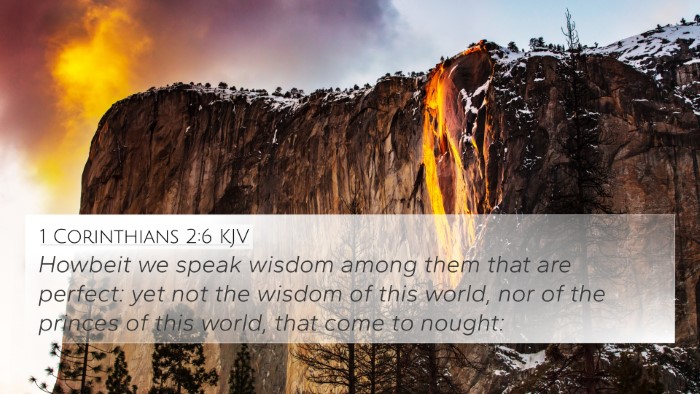
1 Corinthians 2:6 (KJV) »
Howbeit we speak wisdom among them that are perfect: yet not the wisdom of this world, nor of the princes of this world, that come to nought:
Job 28:20 Verse Analysis and Similar Verses
Understanding Job 28:20
Job 28:20 reads: "Whence then cometh wisdom? and where is the place of understanding?" This verse stands as a profound inquiry into the nature and origin of wisdom and understanding, expressing Job's deep desire to comprehend the enigmatic processes of life.
Contextual Overview
In the surrounding chapters of the Book of Job, wisdom is portrayed as something precious and elusive, far removed from earthly pursuits. Job, after enduring tremendous suffering, turns his attention to the ultimate quest of understanding the ways of God.
Commentary Insights
Insights from various public domain commentaries provide a deeper understanding of this verse:
- Matthew Henry: He emphasizes that true wisdom cannot be sourced from human intellect or earthly wealth. Instead, it is a divine quality that requires humility and recognition of one's limitations. Henry notes how Job's inquiry leads the reader toward the understanding that wisdom is found in revering God.
- Albert Barnes: Barnes draws attention to the rhetorical nature of Job's question, highlighting that it serves to illustrate humanity's inability to grasp divine wisdom. He proposes that wisdom is a divine gift that transcends human ability to discern its origin.
- Adam Clarke: Clarke points out that this verse encapsulates a universal question grappling with the existence of wisdom. He characterizes it as a reminder that wisdom is often hidden and challenges believers to seek it earnestly. Clarke also notes biblical parallels that connect this theme with the attributes of God and the fear of the Lord.
Cross-References and Thematic Connections
Job 28:20 can be intricately connected to several other scripture passages that echo similar themes regarding wisdom and understanding:
- Proverbs 2:6: "For the Lord gives wisdom; from His mouth come knowledge and understanding." This connectively emphasizes the idea that wisdom originates from God alone.
- Proverbs 3:13: "Blessed is the one who finds wisdom, and the one who gets understanding." Here, the search for wisdom is paralleled with blessings, reiterating the importance of seeking it.
- Job 12:13: "With God are wisdom and might; He has counsel and understanding." This illustrates that genuine wisdom is integral to God’s character.
- Psalms 111:10: "The fear of the Lord is the beginning of wisdom; all those who practice it have a good understanding." This verse emphasizes that the reverence for God is foundational to attaining wisdom.
- James 1:5: "If any of you lacks wisdom, let him ask of God, who gives to all liberally and without reproach, and it will be given to him." This New Testament connection encourages believers to seek divine wisdom through prayer.
- 1 Corinthians 1:25: "For the foolishness of God is wiser than men, and the weakness of God is stronger than men." This presents a New Testament perspective on the comparison between divine wisdom and human intellect.
- Ecclesiastes 2:13: "And I saw that wisdom excels folly as light excels darkness." This reinforces the superiority of wisdom, inviting contemplation on its true worth.
- Proverbs 4:7: "Wisdom is the principal thing; therefore get wisdom: and with all thy getting get understanding." It accentuates the urgency in seeking wisdom.
- Proverbs 16:16: "How much better to get wisdom than gold! To get understanding is to be chosen rather than silver." Here, the juxtaposition of wisdom against material wealth reinforces its ultimate value.
The Importance of Seeking Wisdom
This theological exploration of Job 28:20 reveals critical truths about wisdom that resonate through scripture:
- Divine Origin: The understanding that true wisdom emanates from God invites believers to seek it through prayer and reverence.
- Human Limitation: Recognizing our finite understanding encourages a humble approach to life and faith.
- Connection to the Fear of the Lord: Emphasizing the necessity of revering God as the foundation of wisdom directs our focus on spiritual maturity.
Conclusion
In summary, Job 28:20 serves as a poignant reminder of the profound nature of wisdom and understanding. By examining the insights from eminent biblical scholars and cross-referencing related scriptures, we can gain a richer, more contextual understanding of this query. As believers and seekers of truth, we are invited to pursue wisdom with earnestness, relying on God as the ultimate source.
